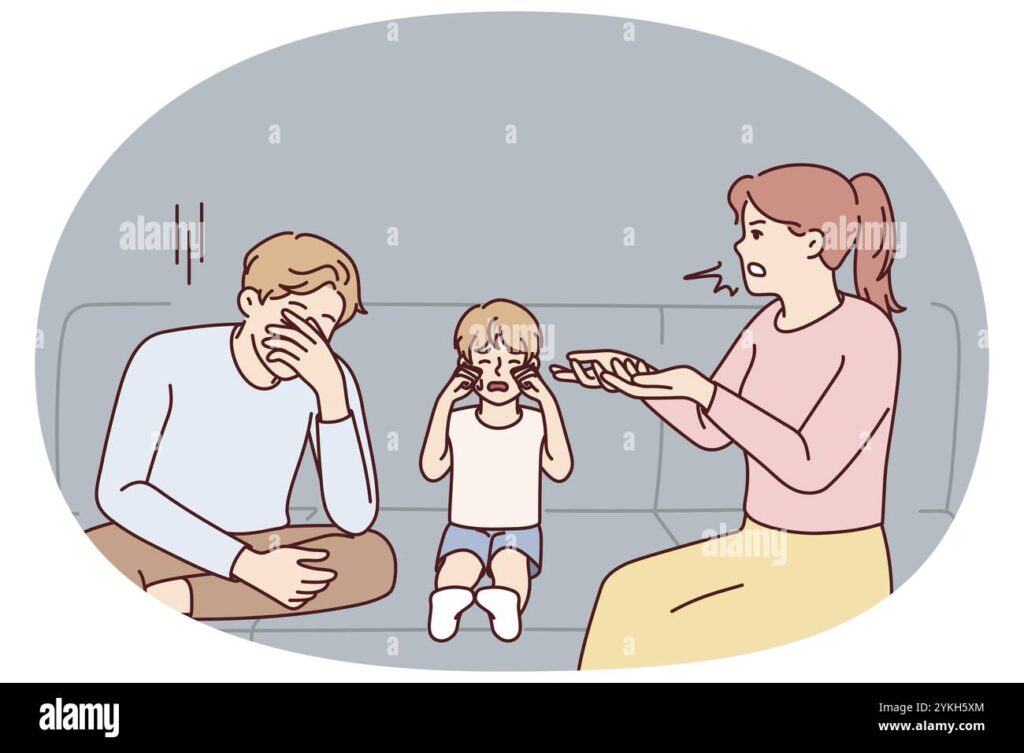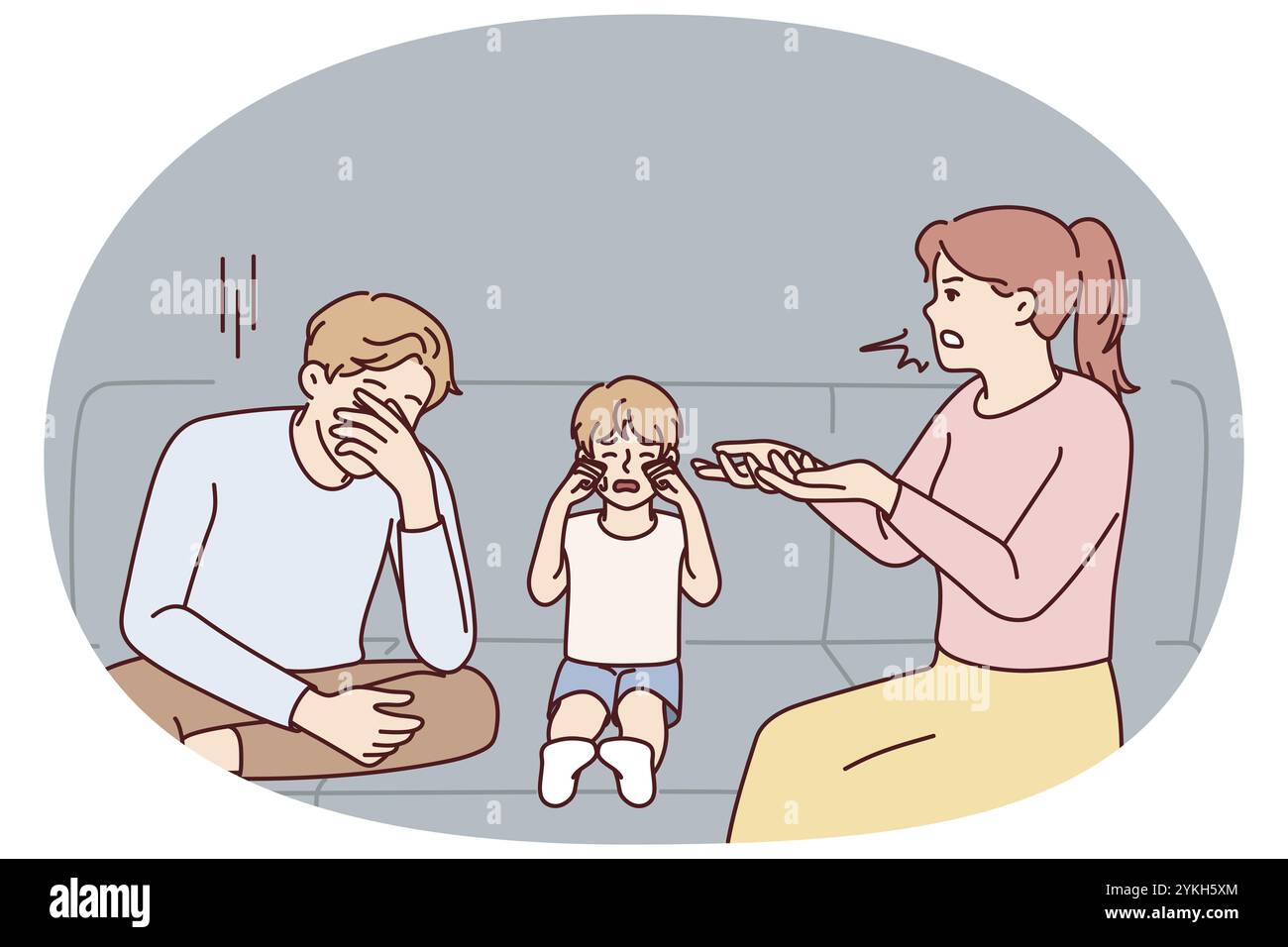
Navigating the Storm: Understanding and Addressing the Impact of Father and Mother Fighting
Witnessing a constant barrage of arguments between parents, specifically the father and mother fighting, can be a profoundly unsettling experience for children. Beyond the immediate emotional distress, such conflict can have lasting repercussions on their development, well-being, and future relationships. This article delves into the multifaceted impact of parental conflict, exploring the psychological effects on children, the common causes of such discord, and practical strategies for mitigating the damage and fostering a more harmonious family environment. Understanding the dynamics at play is the first step towards creating a healthier and more supportive atmosphere for everyone involved, especially the children caught in the crossfire of a father and mother fighting.
The Psychological Impact on Children
Children are incredibly perceptive. They absorb the emotional climate of their home, and constant exposure to parental conflict, even if it’s not directed at them, can be deeply damaging. The psychological impact of a father and mother fighting can manifest in various ways, depending on the child’s age, temperament, and the severity of the conflict.
Increased Anxiety and Stress
One of the most common effects is heightened anxiety. Children may worry about their parents’ well-being, fear the possibility of separation or divorce, and feel a constant sense of unease. This anxiety can manifest physically, leading to sleep disturbances, stomach aches, and other stress-related symptoms. The constant tension of a father and mother fighting creates a hyper-vigilant state where children are always on edge, anticipating the next argument.
Emotional and Behavioral Problems
Children exposed to frequent parental conflict are also at a higher risk of developing emotional and behavioral problems. Some may become withdrawn and depressed, struggling to express their feelings or connect with others. Others may act out, exhibiting aggression, defiance, or difficulty following rules. These behaviors can be a cry for help, a way of coping with the overwhelming stress of their home environment. The impact of a father and mother fighting can significantly disrupt a child’s emotional regulation and self-esteem.
Academic Difficulties
The stress and anxiety associated with parental conflict can also interfere with a child’s academic performance. Difficulty concentrating, lack of motivation, and increased absenteeism can all contribute to lower grades and academic struggles. When a child is constantly worried about their parents fighting, it becomes difficult to focus on schoolwork. The emotional toll of a father and mother fighting can create a significant barrier to learning.
Relationship Problems Later in Life
Perhaps one of the most concerning long-term effects of witnessing parental conflict is the impact on a child’s future relationships. Children who grow up in homes where the father and mother fighting is common may develop unhealthy relationship patterns. They may struggle with trust, intimacy, and conflict resolution. They may either avoid conflict altogether or repeat the patterns they witnessed in their own relationships. The exposure to dysfunctional communication and unhealthy conflict resolution strategies can significantly shape their understanding of relationships and their ability to form healthy connections.
Common Causes of Parental Conflict
Understanding the underlying causes of parental conflict is crucial for addressing the issue effectively. While every relationship is unique, some common factors contribute to arguments between parents.
Financial Stress
Financial difficulties are a significant source of stress for many families. Money-related arguments are common, especially during times of economic hardship. Disagreements over budgeting, spending, and financial priorities can escalate into heated conflicts. The pressure of providing for a family, coupled with financial insecurity, can create a breeding ground for arguments between the father and mother fighting.
Division of Labor
Unequal division of household chores and childcare responsibilities is another frequent cause of conflict. When one parent feels overburdened and the other feels underappreciated, resentment can build, leading to arguments. This is especially true when both parents work outside the home. The perception of unfairness and lack of support can trigger frequent disputes and contribute to a father and mother fighting.
Differing Parenting Styles
Disagreements over parenting styles are also common. Parents may have different ideas about discipline, education, and how to raise their children. These differences can lead to conflict, especially when parents undermine each other’s authority or send mixed messages to the children. A father and mother fighting over parenting styles can create confusion and insecurity for the children.
Communication Problems
Poor communication skills are often at the root of many relationship problems. When parents struggle to communicate effectively, misunderstandings can arise, leading to arguments. Lack of active listening, defensiveness, and a tendency to interrupt or criticize can all contribute to communication breakdowns. Effective communication is essential for resolving conflict constructively and preventing a father and mother fighting.
External Stressors
External stressors, such as work-related pressure, family issues, or health problems, can also contribute to parental conflict. When parents are under stress, they may be more irritable and less able to cope with everyday challenges. This can lead to increased arguments and a more volatile home environment. The cumulative effect of these stressors can exacerbate existing tensions and increase the likelihood of a father and mother fighting.
Strategies for Mitigating the Damage
While it’s impossible to eliminate all conflict from a relationship, there are strategies that parents can use to minimize the negative impact on their children and foster a more harmonious family environment.
Seek Professional Help
If arguments are frequent and intense, seeking professional help from a therapist or counselor can be beneficial. A therapist can help parents identify the underlying causes of their conflict, develop more effective communication skills, and learn strategies for resolving disagreements constructively. Couples therapy can provide a safe and supportive space for parents to work through their issues and improve their relationship. Addressing the root causes of a father and mother fighting is crucial for long-term resolution.
Improve Communication Skills
Learning to communicate effectively is essential for resolving conflict constructively. This involves practicing active listening, expressing feelings in a calm and respectful manner, and avoiding personal attacks. Parents should also learn to compromise and find mutually acceptable solutions. Improving communication skills can help prevent arguments from escalating and create a more positive communication dynamic. When a father and mother fighting transitions to constructive dialogue, the entire family benefits.
Protect Children from Conflict
It’s crucial to protect children from witnessing parental conflict whenever possible. Avoid arguing in front of them, and never involve them in your disagreements. If an argument does occur in front of the children, reassure them that it’s not their fault and that you will resolve the issue. Creating a safe and stable environment for children is paramount, even amidst conflict. Shielding children from the father and mother fighting helps minimize the emotional damage.
Focus on Co-Parenting
Even if parents are no longer together, it’s important to focus on co-parenting effectively. This involves communicating respectfully, making joint decisions about the children’s upbringing, and supporting each other’s roles as parents. A united front can help minimize the negative impact of separation or divorce on the children. Prioritizing the children’s well-being and minimizing conflict is essential for successful co-parenting. Even after separation, a father and mother fighting can still negatively affect the children.
Create a Stable and Supportive Home Environment
Creating a stable and supportive home environment is essential for children’s well-being. This involves providing consistent routines, clear expectations, and plenty of love and affection. A nurturing environment can help children cope with the stress of parental conflict and build resilience. A stable home can act as a buffer against the negative effects of a father and mother fighting.
The Importance of Self-Care
Parents who are constantly engaged in conflict often neglect their own needs. It’s crucial for parents to prioritize self-care and take time for themselves to recharge. This can involve engaging in hobbies, spending time with friends, or simply relaxing and de-stressing. When parents are healthy and well-rested, they are better able to cope with stress and manage conflict effectively. Prioritizing self-care can help prevent burnout and reduce the likelihood of a father and mother fighting.
Conclusion
The impact of a father and mother fighting can be significant and far-reaching, affecting children’s emotional, behavioral, and academic well-being. Understanding the causes of parental conflict and implementing strategies for mitigating the damage is essential for creating a healthier and more supportive family environment. By prioritizing communication, seeking professional help when needed, and protecting children from conflict, parents can minimize the negative impact and foster a more harmonious home for everyone. Ultimately, addressing the issue of a father and mother fighting is an investment in the well-being of the entire family.
[See also: How to Communicate Effectively with Your Partner]
[See also: Signs of a Toxic Relationship]
[See also: The Impact of Divorce on Children]

